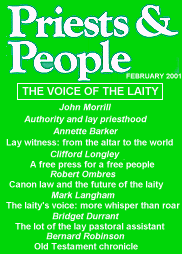CONTENTS
February 2001

Click here to buy
this Issue
'When lay men and women enter the sanctuary and stand around the altar and at the ambo, they are proclaiming their partnership in the action of evangelisation.' John Morrill is both Professor of British and Irish History at Cambridge University and a permanent deacon of the Diocese of East Anglia. Here, writing as a historian rather than as a theologian, he explores a perennial tension within the Church about the nature and extent of clerical and lay authority.
'The commitment (of active lay people in church) is expressed primarily around the altar within the Church, rather than in the secular world.' So says Annette Barker, the Director of Education for Parish Service, an independent lay course under the auspices of the Archdioceses of Westminster and Southwark. She argues here that 'a deeper understanding of what is involved in lay witness in lay witness can be achieved if formation takes place. The lay participation can move beyond the private sphere of the individual or the church community at the altar, to the wider world.'
How can the Church best meet the 'democratic deficit' in its organisation? Veteran Catholic journalist Clifford Longley offers insights from the point of view of the laity, the media and the Church's authorities, bringing them together for the benefit of all.
How do the laws of the Church contribute towards 'maximising therole of the God-given experience and expertise of the laity in the Church and making the lay contribution visible and dignified'? Robert Ombres, who teaches canon law and theology at Blackfriars, Oxford, unpacks the Code of Canon Law and shows how far it provides for the flourishing of lay people's priestly, kingly and prophetic roles.
How can a priest encourage lay parishioners to express themselves when he is met with 'dynamic apathy'? Mark Langham, a priest in an inner-London parish, shares his frustrations - and the lessons he learnt - in attempting to hear the voice of the laity.
Returning to employment after her children were well established in school life involved Bridget Durrant in taking on paid pastoral work part time for her parish. How did this come about, and how do priest, parish and lay pastoral assistant work together for the good of all?
Angela Wills, who teaches Scripture at St John's Seminary, Wonersh, and who works in the Department of Collaborative Ministry in the Diocese of Portsmouth, offers some reflections on the lectionary readings for the Sundays and Holy Days of August.










